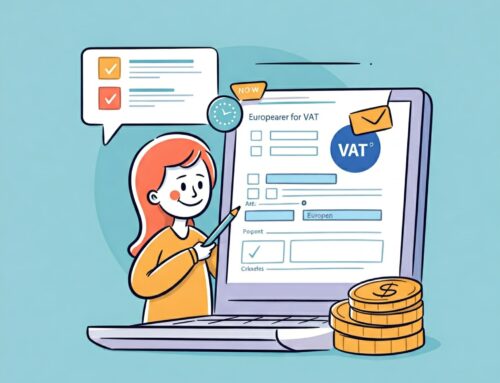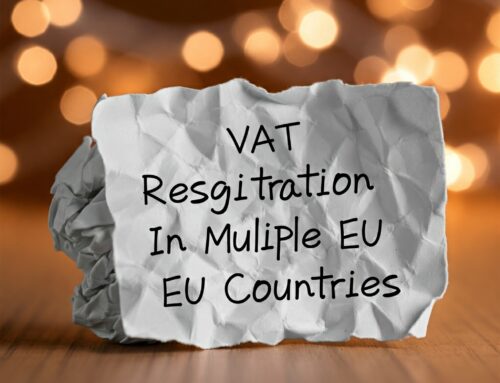This article has been written after the the substantial change in VAT regulation of July 2021.
Who Needs a European VAT Number and Where to Get It? This is the big question that all companies ask themselves when they start planning their expansion from non-European markets to the EU market. In this article, we delve into VAT Identification Numbers (EU VAT ID, European VAT number) and offer you a manageable guide on who needs it and where to get it.
In compliance with the latest regulations on the One-Stop Shop (OSS) system implemented in 2021, we have provided complete information in this article about the requirements to obtain a VAT identification number within the European Union (EU):
Who needs a European VAT number?
If your business is not established in any EU country, you must obtain a VAT identification number (VAT ID) when making your first business-to-consumer (B2C) sale.
If your business is established in an EU country (and nowhere else), you must obtain a VAT identification number (VAT ID) if you meet any of the following conditions:
Your annual sales throughout the EU exceed the threshold of €10,000.
You store goods within an EU country.
If your situation does not fall into any of these categories, there is no legal obligation to register for a VAT identification number (VAT ID). However, it is highly recommended by VAT professionals, as it offers numerous benefits for your business.
Detailed requirements and actions for VAT registration of non-European companies
1. Do I Need a European VAT Number?
The first thing is to know if you are required to obtain it. Here’s a summary:
✅ YES, you need a VAT number if:
-
📦 You store products in the EU: Even if your business is not physically in the EU, if you store goods in any member country, you need a VAT number in that country.
-
💼 You sell at a distance (B2C) to end consumers in the EU and exceed €10,000 in annual sales: In this case, you can choose the OSS (One-Stop Shop) scheme or register for VAT in each country where you sell.
-
🚚 You dropship to the EU:
-
Orders over €150: You need a VAT number in the destination country of the goods.
-
Orders under €150: You can use the IOSS (Import One-Stop Shop) scheme, but Hellotax does not offer this service. If you don’t use IOSS, you need to register for VAT in each country where you sell.
-
❌ NO, you do NOT need a VAT number if:
-
💼 You only sell to other businesses (B2B) with a valid EU VAT number: In this case, the reverse charge mechanism applies.
-
💰 Your B2C sales to the EU are less than €10,000 per year: And you do not store products in the EU.
2. How and Where Do I Register for VAT in the EU?
The registration process and location depend on where your business is established and how you make your sales:
🌐 Business NOT established in the EU (e.g., USA, UK, China, etc.):
-
Sales through marketplaces (Amazon, eBay, etc.):
-
If the marketplace acts as a “Deemed Supplier”, they usually take care of collecting and declaring VAT in most cases.
-
If you use Amazon FBA and store your products in their logistics centers, you need to register for VAT in each country where your products are stored.
-
-
Direct sales to consumers (B2C) from outside the EU (value over €150):
-
You need to register for VAT in each country where you sell.
-
-
Direct sales to consumers (B2C) from outside the EU (value under €150):
-
You can use the IOSS scheme (Import One-Stop Shop) to simplify the process, but Hellotax does not offer this service.
-
-
Direct sales to consumers (B2C) from within the EU:
-
You can register in one EU country and use the OSS scheme (One-Stop Shop) to declare VAT for all EU countries.
-
🏢 Business established in the EU:
-
If your business is established in an EU country, you must register in that country.
-
If you exceed €10,000 in B2C sales to other EU countries, you can use the OSS scheme to simplify VAT management.
3. What Documents Do I Need for VAT Registration?
Requirements vary by country, but in general, you will need:
-
📄 Certificate of incorporation of the company (issued within the last 6 months).
-
📄 VAT certificate from your country (if applicable).
-
📄 Proof of tax ID that the company is registered for year-end tax.
-
📄 Company Articles of Association.
-
📄 Company bank statement.
-
🆔 Identification of the directors (passport or ID card).
-
📸 Selfie of the director with their passport or ID card (for identity verification).
-
📝 Proof of business activity in the EU (e.g., sales invoices).
-
🌐 Proof of online commercial activity (screenshots of your online store).
-
📝 Power of attorney (if using a fiscal representative).
⚠️ Attention! All documents must be translated into the official language of the country where you are registering. Some countries, such as Spain, require certified and apostilled translations.
4. How Long Does the Registration Process Take?
The registration process usually takes between 8-12 weeks, but it can vary depending on the country.
5. Do I Need a Fiscal Representative?
❗ Important: Some countries, such as France, Italy, Spain, and Poland, require non-EU companies to appoint a fiscal representative. This implies additional costs.
6. What if I Sell Through Amazon FBA?
📦 If you use Amazon FBA and store your products in their logistics centers, you need to register for VAT in each country where your products are stored.
7. What if I Sell From My Own Website?
-
🛒 Shipments under €150: You can use the IOSS scheme (Import One-Stop Shop) to simplify the process, but Hellotax does not offer this service.
-
🛒 Shipments over €150: You need to register for VAT in each country where you sell, unless you are using the OSS scheme.
➡️ Ready to Simplify Your VAT Management in the EU?
Contact us and we will advise you without obligation.




